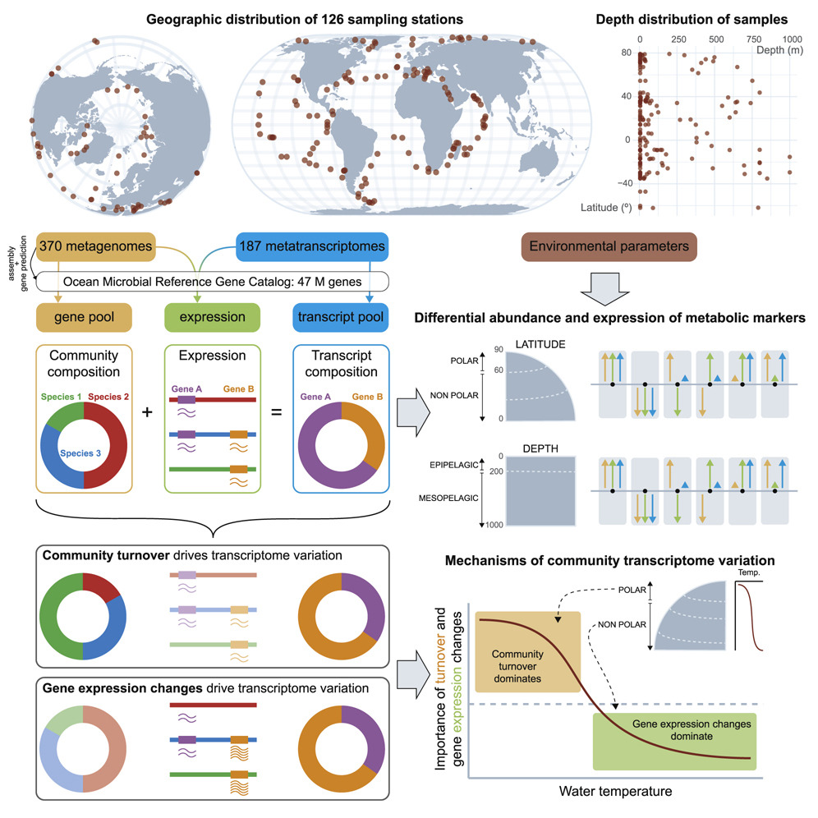BDB-Lab members involved
Gene Expression Changes and Community Turnover Differentially Shape the Global Ocean Metatranscriptome

Gene Expression Changes and Community Turnover Differentially Shape the Global Ocean Metatranscriptome
by Guillem Salazar, Lucas Paoli, Adriana Alberti, Jaime Huerta-Cepas, Hans-Joachim Ruscheweyh, Miguelangel Cuenca, Christopher M. Field, Luis Pedro Coelho, Corinne Cruaud, Stefan Engelen, Ann C. Gregory, Karine Labadie, Claudie Marec, Eric Pelletier, Marta Royo-Llonch, Simon Roux, Pablo Sanchez, Hideya Uehara, Ahmed A. Zayed, Georg Zeller, Margaux Carmichael, Celine Dimier, Joannie Ferland, Stefanie Kandels, Marc Picheral, Sergey Pisarev, Julie Poulain, Silvia G. Acinas, Marcel Babin, Peer Bork, Chris Bowler, Colomban de Vargas, Lionel Guidi, Pascal Hingamp, Daniele Iudicone, Lee Karp-Boss, Eric Karsenti, Hiroyuki Ogata, Stephane Pesant, Sabrina Speich, Matthew B. Sullivan, Patrick Wincker, Shinichi Sunagawa, Silvia G. Acinas, Marcel Babin, Peer Bork, Emmanuel Boss, Chris Bowler, Guy Cochrane, Colomban de Vargas, Michael Follows, Gabriel Gorsky, Nigel Grimsley, Lionel Guidi, Pascal Hingamp, Daniele Iudicone, Olivier Jaillon, Stefanie Kandels-Lewis, Lee Karp-Boss, Eric Karsenti, Fabrice Not, Hiroyuki Ogata, Stephane Pesant, Nicole Poulton, Jeroen Raes, Christian Sardet, Sabrina Speich, Lars Stemmann, Matthew B. Sullivan, Shinichi Sunagawa, Patrick Wincker
Abstract
Ocean microbial communities strongly influence the biogeochemistry, food webs, and climate of our planet. Despite recent advances in understanding their taxonomic and genomic compositions, little is known about how their transcriptomes vary globally. Here, we present a dataset of 187 metatranscriptomes and 370 metagenomes from 126 globally distributed sampling stations and establish a resource of 47 million genes to study community-level transcriptomes across depth layers from pole-to-pole. We examine gene expression changes and community turnover as the underlying mechanisms shaping community transcriptomes along these axes of environmental variation and show how their individual contributions differ for multiple biogeochemically relevant processes. Furthermore, we find the relative contribution of gene expression changes to be significantly lower in polar than in non-polar waters and hypothesize that in polar regions, alterations in community activity in response to ocean warming will be driven more strongly by changes in organismal composition than by gene regulatory mechanisms.
Full text: https://doi.org/10.1016/j.cell.2019.10.014
Copyright (c) 2018–2025. Luis Pedro Coelho and other group members. All rights reserved.
